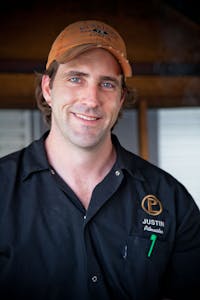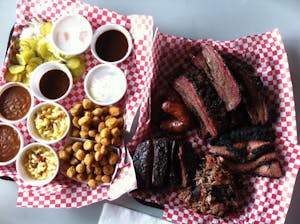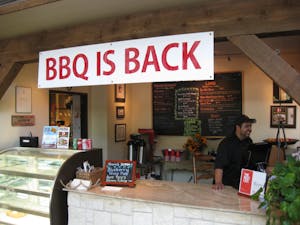 Justin Fourton
Justin Fourton
Owner/Pitmaster: Pecan Lodge; opened in 2010
Age: 37
Smoker: Steel smoker with an offset firebox
Wood: Mesquite and Oak
I called Justin Fourton on his day off to set up this interview. His voice mail was full. He is a man in demand, but is always generous with his time. I drove to his restaurant where an employee watching the smoking pits said he had just left. When we finally hooked up it was on the patio of a Starbuck’s on Knox Street in Dallas. Justin takes his coffee black. On this cloudy morning he had a half an hour to kill while his wife and son did some shopping. This was the first time I’d seen him in him in a Polo shirt and khaki shorts, but he was still wearing the ratty burnt orange hat that you see in the photo.
During our talk I learned about the origins of Pecan Lodge, which he started with his wife Diane. I also learned how the business almost failed only to come back and gain more popularity than they ever hoped for. Back in 2008 when the last Texas Monthly Top 50 came out, Justin barely knew his way around an offset pit. This time around he made it in the Top 4 in the state, therefore the world.
Daniel Vaughn: Pecan Lodge is located within Shed #2 of the Dallas Farmers Market. Why did you decide to open there instead of a stand-alone building?
Justin Fourton: When we were looking around for a location, the city had a tremendous amount of incentives for businesses to open in the market. We were also regular patrons of the market, so we were familiar with it. Back in 2009 we were transitioning from our work with Accenture (Justin and his wife and business partner Diane were both corporate consultants) to the catering business. Even when we opened the restaurant, our intention was to focus on catering. The agreement with the market required that we opened the restaurant on Thursday through Sunday, so we opened for lunch to meet our end of the bargain.
DV: Did the name Pecan Lodge come from your choice of smoking wood?
JF: That name came from my grandfather’s ranch in Abilene called Pecan Lodge, but we use primarily mesquite. The mesquite wood influence came from there, but most of what we did was grilling over wood while out on the ranch hunting for deer or doves. My other grandfather lived in East Texas and used a traditional offset pit. What I learned there with him is what really affected how we cook now.
DV: Do you use only mesquite?
JF: We’ve moved to using a blend of mesquite and oak. The mesquite burns hot and quick so we layered in some oak to increase our burn time. There’s not an exact mix, but it’s a mesquite-heavy blend.
DV: You work with barbecue every day, but I’ve heard you and Diane have taken barbecue road trips in Texas. Were those vacations or research trips?
JF: Part of it was for fun to get away and see some scenery. The other part was to try and understand where we fit in with the legendary places in the state. It’s easier to eat it when you don’t have to cook it yourself.
DV: Did those trips change the way you cook?
JF: Our barbecue has evolved. I don’t think that it’s ever perfect, so we’re always tweaking. During a trip to Lockhart, I had the best bite of barbecue I’ve ever had from Black’s. Having those bites of brisket and beef rib set a mental target to shoot for.
DV: You have a metal shed surrounding your pit just outside the kitchen door. Is that to keep out meat thieves?
JF: We operated for about a year without the enclosure. The city allowed us to operate under a permit that was more for special events. They were also our landlord so we didn’t think much of it. In our second year, the city required that we operate under the actual restaurant code and that required that the pit have an enclosure. That was probably the most significant challenge that we faced as a business. We had to stop selling barbecue for two months while it was constructed. It almost put us out of business.
DV: So the City of Dallas was your landlord and the entity that controlled your permit, and it almost put one of its tenants out of business?
JF: Yes, basically.
DV: How has your relationship been with the city since then?
JF: For the most part they’ve been good to work with, but as of yesterday the city is no longer our landlord. They sold the market to a private developer—they were in negotiations for the past year. This all happened at the same time that we needed to get more pits going for the restaurant, but the city wouldn’t allow us to add the pit because they didn’t want to affect the development plans for Shed #2.
DV: How has the recent privatization affected the business?
JF: As early as last September we’ve been looking for another permanent location. It’s part of a contingency plan depending on what happens at the market. If we could add the pit capacity that we need at the market then we’d probably be able to operate there. It’s home. It’s where we started, but having a space where we can control the atmosphere, the music, the beer sales, and the smoker capacity would be great for us.
DV: If you had a second pit do you think you could sell all that meat?
JF: I think so. We swapped out our original pit, Lurlene, for a bigger one named Virgil, in March, which gave us thirty percent more capacity and that capacity was absorbed pretty quickly. If we had another pit we could open up for pre-orders and we could do a lot more catering that we get constant requests for.
DV: How has the line at Pecan Lodge changed since you opened a little over three years ago?
JF: Diners, Drive-Ins, and Dives aired a little over a year ago. Before then we had about twenty people in line when we opened. Once the show aired we went to a hundred people. We thought that might peak a few weeks after, but we anticipated a slow decline eventually. When that show re-airs on a weekend, then we’ll see about a twenty percent bump. When the magazine hit the newsstands, there was a lag of about a week before we saw the real impact. We saw about a forty percent bump.
DV: With the line and all that demand, have you considered expanding your hours?
JF: Until we had the right staff in place, we didn’t feel like we could open for more than four days a week and keep up our quality of life with our family. Now I think we have the right staff, so starting next week we will be opening on Wednesdays.
DV: Are you ready to open up the floodgates and go on record with that?
JF: I’m ready.
DV: You make your own sausage here. How was the decision made to do that rather than ordering sausage from someone else?
JF: When we first opened, the only barbecue we had on the menu was brisket and ribs, and we operated that way for the first year. When we stopped serving barbecue for those two months I realized how important it was. When we brought barbecue back, I wanted to expand the meat offerings that would allow us to be compared to the more traditional barbecue places throughout the state. Everything we do here is made from scratch, and we wanted to take the same approach with the sausage, so we learned how to make it.
DV: You mentioned again the day you brought barbecue back to Pecan Lodge after the pit enclosure was built. You said the business was crippled and almost closed during that period. Tell us the story of the banner you hung that day.
JF: We viewed ourselves to be a Southern and Texan comfort food restaurant, and barbecue was just one of those things. During the time we took barbecue off the menu we realized how many of our customers were coming just for the barbecue. The day before we brought it back we had about $300 left in the bank account. We cashed in all of our chips. We bought all the meat we could afford and a banner that read “BBQ IS BACK”. We needed to announce ourselves, and we needed to sell out of meat that day. It was all or nothing at that point. It’s scary thinking back on how close we came to not making it. It’s a good feeling to look back on that day now that we’re one of the four best barbecue joints in the state.
DV: Now that Texas Monthly named you one of the top four joints in the state, there are about two hundred people in line at opening time and the first person in line gets to ring the dinner bell to announce when you open. How did that tradition start?
JF: It’s a chuck wagon triangle that hangs there at the front counter. When we first opened there was a sign that read “ring bell for service.” That was because we’d only have two people at the restaurant. At about 1:00 p.m., we’d send someone home, and I was the only one left. I’d be back washing dishes or prepping meat, and I needed to listen for the bell in case we got a customer.
DV: Have you had to change the way you cook since your customers have increased?
JF: We’ve had to cook things in stages. We cook a bit hotter because there’s more meat on the pit because we need to finish them faster. We have a very tight schedule to have everything ready when we open. With just one pit our smoking process is on a 24-hour cycle. There’s never a point from Wednesday night to Sunday morning that we don’t have meat on the pit. The higher temperature allows us to cook a bit faster, but you have to pay more attention. You have to rotate meat and really keep and eye on the hot spots on the pit.
DV: Is anyone else trained to work the pit? Are you worried about them learning enough to leave?
JF: Absolutely. I’ve got four guys that are trained to operate the pit. We have non-disclosure agreements in place, but the main thing is we try to treat everybody well. The pay is good, and there are bonus programs based on meat quality scores during a shift and one at the end of the year that based on the company performance.
DV: You started as a catering operation. How much of your business is catering these days?
JF: Based on the volume at the restaurant we’ve had to adjust the catering operations. At this point the catering portion is shut down for the summer. I get about a hundred requests a week for catering, and we could probably sell the same amount of meat catering as we do in the restaurant if we had the pit capacity.
DV: With all that demand, when is the second location of Pecan Lodge open?
JF: It’s not gonna happen. We just need somewhere bigger with more capacity for customers and more pit room.
DV: Have you ever stood in line for someone else’s barbecue?
JF: Yes. Aaron Franklin’s barbecue. He returned the favor this past week. That was a surreal experience.
DV: What other surreal experiences have you had at the restaurant?
JF: A few days ago some band members from Guns & Roses stopped in. They wanted to help make sausage, so we let them.
DV: With all this attention and all these rock stars coming in, do you feel like a rock star yourself?
JF: No. It’s not a glamorous business compared to rock and roll. Both have a lot of smoking going on in the late hours, but theirs is more fun.
Photo of Justin Fourton by Nicholas McWhirter.









